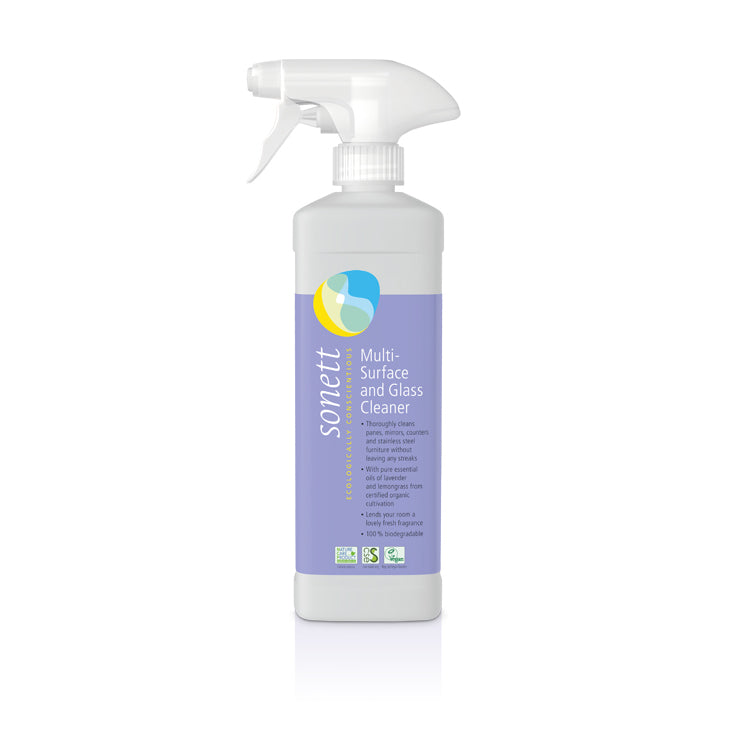
- Made in Germany
The Glass Cleaner develops its very good cleaning performance even with heavily soiled greasy surfaces and lends the rooms a lovely fresh fragrance.
Thoroughly cleans small glass surfaces such as panes, mirrors, and counters without leaving any streaks.
500 ml bottle with spray nozzle.
Application
Thoroughly cleans small glass surfaces such as panes, mirrors, and counters without leaving any streaks. Cleans stainless steal and plastic surfaces and removes finger prints from metal surfaces.
For the cleaning of extra large window panes, please use Sonett All-Purpose Cleanser and work with sponge and squeegee.
Dosage
Spray thoroughly onto surface and polish dry with a microfibre cloth. Please remove heavy dirt beforehand.
Product declaration
Vegetable alcohol (ethanol) 15–30%
Sugar surfactant and coconut oil alcohol sulphate <1%
Natural essential oils of lavender and lemongrass,
certified organically grown <1%
Water, swirled up to 100%
List of ingredients as per EC 648/2004
Aqua, alcohol, alkylpolyglucoside C10–C16 (lauryl glucoside), sodium C12–C14 fatty alcohol sulphate
(sodium lauryl sulfate), parfum*, linalool*, citral*
*certified organically grown
Origin and properties of the ingredients
Ethanol is obtained by fermenting the starch, contained in maize and potatoes. The concentration of the alcoholic solution of the Glass Cleaner is such, that it leaves no streaks on the glass surface and that the latter will dry quickly. In addition, ethanol helps to thoroughly eliminate greasy dirt. Coconut oil alcohol sulphate and sugar surfactant, obtained from vegetable starch and coconut oil, help to macerate and loosen dirt.
Technical data
Density: 20 °C approx.0.978 g / cm³ (68 °F approx. 0.034 oz / in³)
pH value: 20 °C, 5 g / litre H₂O (68 °F, 0.18 oz / 34 fl oz US H₂O) approx. 7–8
Biodegradability
Ethanol, in small quantities, is also present in nature. Once fed into waste water, it is rapidly and completely degraded into carbon dioxide and water. During the manufacturing process of coconut oil alcohol sulphate and sugar surfactants, the organic constituents of the coconut oil and starch types are combined in such a way that their natural molecular structure remains intact. For this reason it is relatively easy for the microorganisms to 100% decompose these surfactants. Sugar surfactants and coconut oil alcohol sulphate are classified as readily biodegradable according to OECD guidelines.
Suitable for septic tanks and filtration systems.
Certification
CSE (Certified Sustainable Economics)
Packaging
Bottle, canister: PE
Cap: PE / PP
Label: PE

